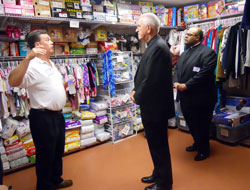St. Elizabeth-Catholic Charities in New Albany and Louisville Archdiocese eyeing collaboration of services

Mark Casper, left, director of St. Elizabeth-Catholic Charities in New Albany, stands in a storeroom at St. Elizabeth’s transitional home on July 27. He is describing to Louisville Archbishop Joseph E. Kurtz and Father Anthony Chandler, pastor of Immaculate Conception Parish in LaGrange, Ky., the many interfaith contributions the agency receives, including baby clothes, diapers and car seats. (Photo by Patricia Happel Cornwell)
By Patricia Happel Cornwell (Special to The Criterion)
NEW ALBANY—When Louisville Archbishop Joseph E. Kurtz visited St. Elizabeth-Catholic Charities in New Albany on July 27, agency director Mark Casper said, “We don’t consider the Ohio River a barrier. It’s just a little water we have to jump over.”
New Albany, which is located in south central Indiana, is directly across the Ohio River from Louisville, Ky. Many residents live in one state, and work or shop in the other.
St. Elizabeth’s-Catholic Charities is the only maternity home in the Archdiocese of Indianapolis. It provides housing, counseling and other services to teenagers and women with unplanned pregnancies, as well as transitional housing after delivery. It merged with Catholic Charities in 2003.
Casper said the agency gives women with unplanned pregnancies “an alternative to abortion.”
The agency’s other programs include adoption services, CASA (Court Appointed Special Advocates) for Floyd and Washington counties, and supported living for developmentally-delayed adults.
Casper led a tour of the maternity and transitional homes for Archbishop Kurtz and other guests, including Father Anthony Chandler, pastor of Immaculate Conception Parish in LaGrange, Kentucky. Father Chandler’s congregation is one of several in that state that contribute to the New Albany agency.
Both Catholic and non-Catholic faith communities contribute funds and supplies. Casper showed the archbishop and other guests two storage rooms full of donated diapers, diaper bags, car seats, baby clothes and toys. Some individuals and groups have also decorated bedrooms in the homes.
Others present to welcome the archbishop were David Siler, executive director of the Indianapolis archdiocese’s Secretariat for Catholic Charities and Family Ministries, and several members of the St. Elizabeth advisory board.
The purpose of Archbishop Kurtz’s visit, according to Jevaline Johnson, St. Elizabeth-Catholic Charities development director, was to explore how the two communities can coordinate delivery of services to women and families.
“We want to collaborate with Catholic Charities in Louisville,” Johnson said. “They offer some services we don’t, and we offer some they don’t. We want to eliminate duplication of services.”
St. Elizabeth’s-Catholic Charities is already affiliated with Kentucky Adoption Coalition, and licensed to handle adoptions in both Kentucky and Indiana.
While most of their clients are from Indiana, 30 percent of their clients and 27 percent of their financial support come from Louisville. Some clients have come from as far away as Tennessee, North Carolina or Alabama.
The maternity home does not have a service area restriction. “Some women find us on the Internet,” said Leslea Townsend-Cronin, social services director. “They like what they see, and don’t care how far away it is. If they can find us, we take them.”
The agency’s various programs served 700 clients in 2010, including 70 women and 50 children in its residential facilities. The maternity home opened in 1989, the transitional home in 1996.
Since opening, the maternity home has assisted in more than 400 births. Women who have had their babies, and who are at least 18, can stay in the transitional house for up to two years—with their children—while going to school or finding employment.
“Before this [program],” Casper said, “parents used to send a pregnant girl off to Aunt Becky in Nebraska.”
At St. Elizabeth’s, he said, young women receive a full gamut of services, from health care and labor coaches to counseling, parenting skills and money management.
“It’s a safe place for these girls to live,” Casper told Archbishop Kurtz. “Many of them come from bad situations with boyfriends or family members. Here, they know they are safe.”
Archbishop Kurtz remarked, “This [visit] is good timing.” He noted an upcoming annual meeting in his archdiocese at which he plans to encourage more Louisville parishes to become involved with St. Elizabeth’s. This summer, one group of Louisville high school students volunteered at the New Albany agency, painting, mulching gardens and organizing a clothes closet.
“We are sensitive to the fact that St. Elizabeth’s is part of the Indianapolis Archdiocese,” Archbishop Kurtz said, “but we are really just one community here.”
The archbishop closed the gathering with a prayer that, “through the intercession of St. Elizabeth, God might bless all those young people who come here, that they may come to lead good and fruitful lives.”
(Patricia Happel Cornwell is a freelance writer and a member of St. Joseph Parish in Corydon. For more information on St. Elizabeth-Catholic Charities in New Albany, log on to www.stelizabethcatholiccharities.org.) †
